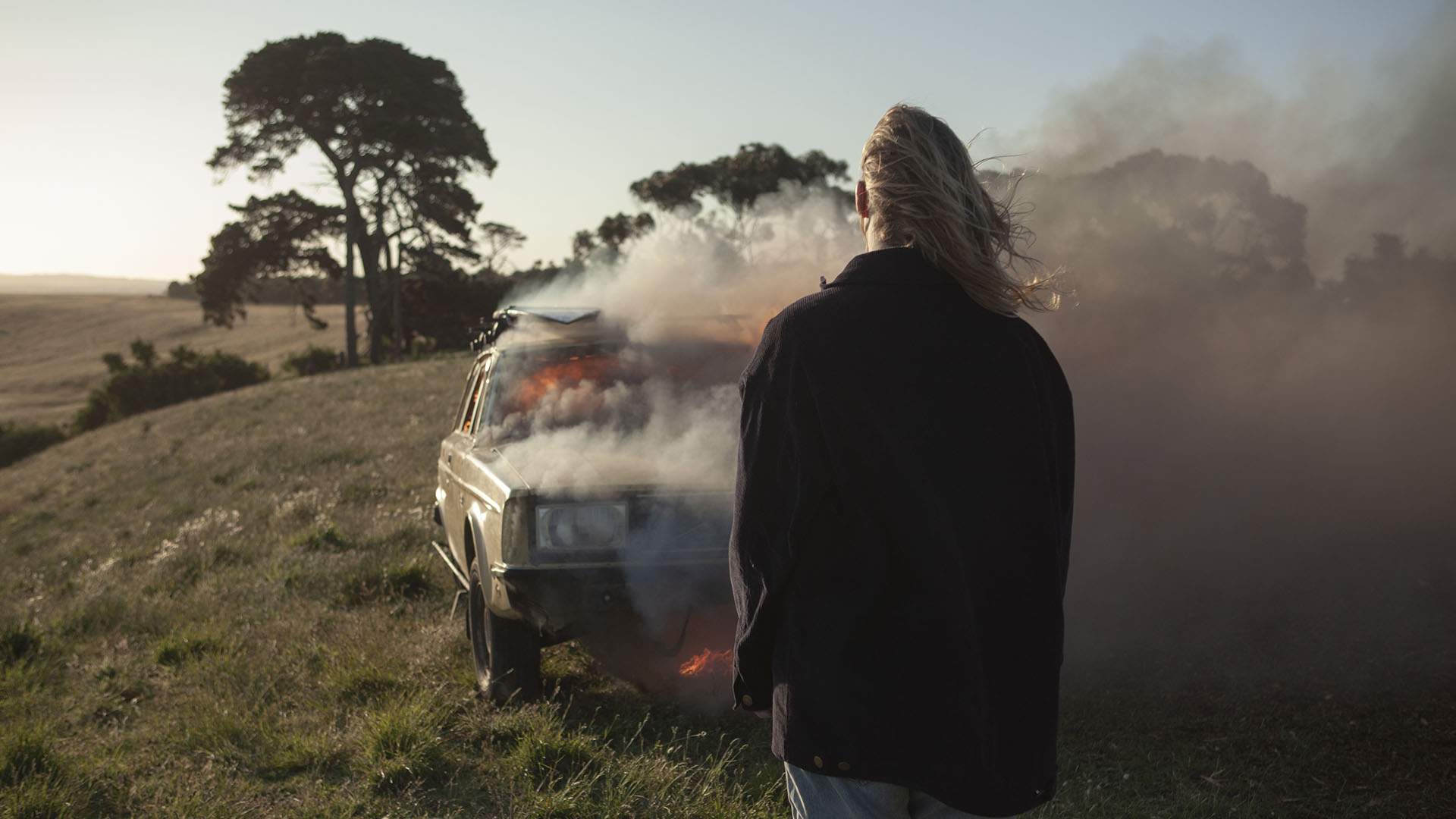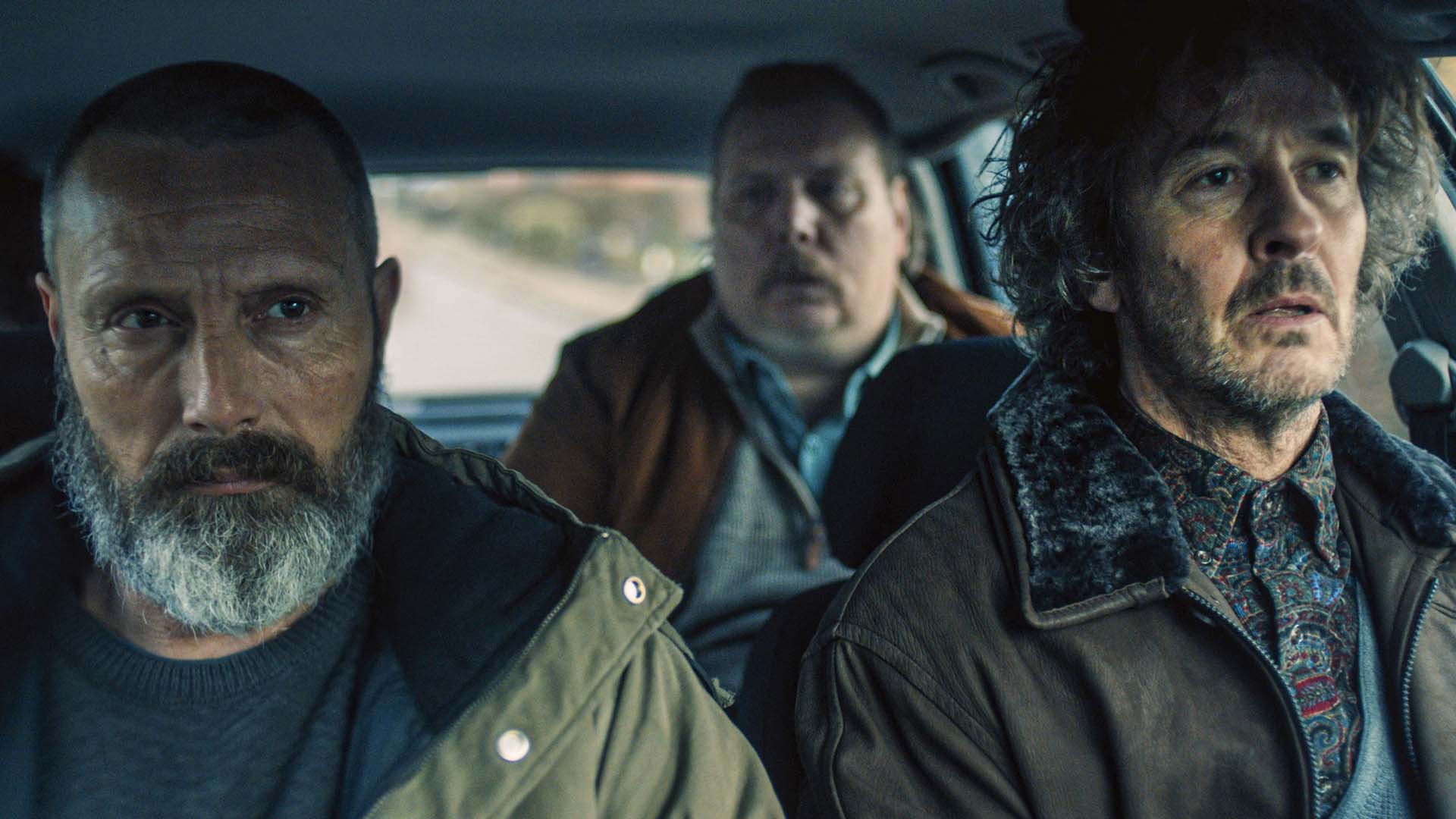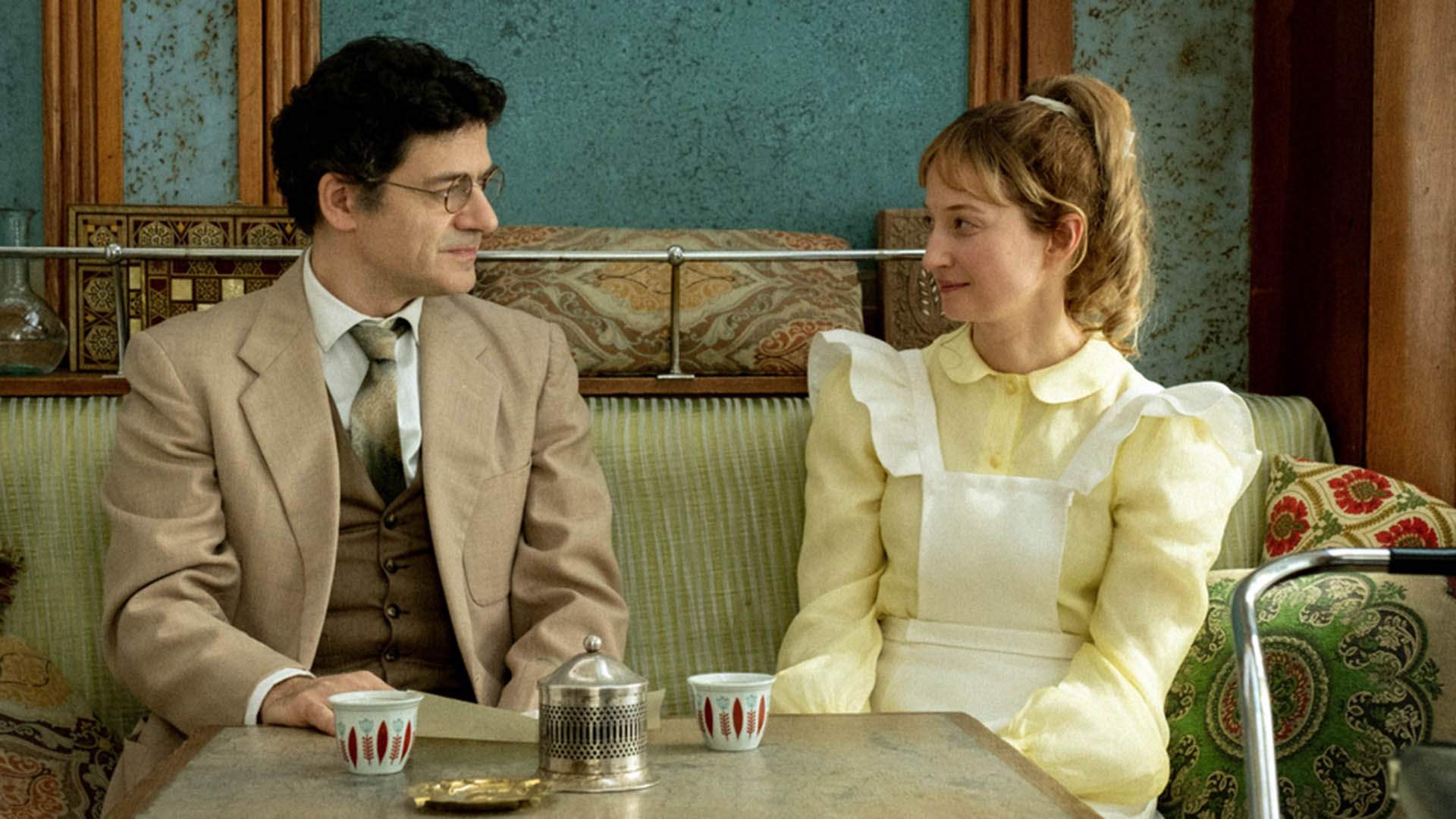The New Movies You Can Watch at Australian Cinemas From September 30
Head to the flicks to watch a searing drama about the lead-up to the Port Arthur massacre, Mads Mikkelsen in a delightful revenge comedy and a gorgeous look at marriage during the Lebanese Civil War.
Something delightful has been happening in cinemas in some parts of the country. After numerous periods spent empty during the pandemic, with projectors silent, theatres bare and the smell of popcorn fading, picture palaces in many Australian regions are back in business — including both big chains and smaller independent sites in Brisbane at present.
During COVID-19 lockdowns, no one was short on things to watch, of course. In fact, you probably feel like you've streamed every movie ever made, including new releases, Studio Ghibli's animated fare and Nicolas Cage-starring flicks. But, even if you've spent all your time of late glued to your small screen, we're betting you just can't wait to sit in a darkened room and soak up the splendour of the bigger version. Thankfully, plenty of new films are hitting cinemas so that you can do just that — and we've rounded up, watched and reviewed everything on offer this week.

NITRAM
It's terrifying to contemplate something so gut-wrenchingly abominable as the bodies-in-barrels murders, which director Justin Kurzel and screenwriter Shaun Grant depicted in 2011's Snowtown, and to face the fact that people rather than evil were behind them. Nitram courts and provokes the same response. Exploring the events preceding the Port Arthur massacre, where 35 people were murdered and 23 others wounded in Tasmania in 1996, it focuses on something equally as ghastly, and similarly refuses to see the perpetrator as just a monster or a Hollywood horror movie-style foe. It too is difficult, distressing, disquieting and disturbing, understandably. In their third collaboration — with 2019's bold and blazing True History of the Kelly Gang in the middle — Kurzel and Grant create another tricky masterpiece, in fact. And, the fact that Nitram is about a person is one key reason for its brilliance. The film's core off-screen duo don't excuse their protagonist. They don't to justify the unjustifiable, explain it, exploit it, or provide neat answers to a near-unfathomable crime. Rather, they're exactingly careful in depicting the lone gunman responsible for Australia's worst single-shooter mass killing, right down to refusing to name him. (The movie's title comes from his moniker backwards, and it's all he's ever called on-screen.) Nitram does depict its eponymous figure's mental health issues and medication, and his status as an outcast, but not as reasons for what's to come. It shows his complicated relationships, mentions his struggles as a boy and sees how he's teased as an adult, yet never deems these motives. All such things can be part of someone's life, or not, and that person can commit heinous deeds, or not — and this tremendous feature doesn't ever even dream of seeing that as a straightforward cause-and-effect equation.
In his fifth stint behind the lens — 2015's blistering Macbeth and 2016's abysmal Assassin's Creed are also on his resume — Kurzel does adopt a hazy aesthetic, though. The film isn't dreamy, instead resembling anxious memories worn and frayed from too much time looping in someone's mind. Its imagery is boxed in within a constricted frame, heightening that sensation; however, cinematographer Germain McMicking (Acute Misfortune) shoots Nitram (Caleb Landry Jones, The Outpost) as if he's roving around the space to test the boundaries. The character does just that narrative-wise. He earns his wearied mother's (Judy Davis, Mystery Road) constant exasperation, and almost everyone else's dismay. His father (Anthony LaPaglia, Below) expresses more warmth, but is just as affected. After knocking on her door attempting to start a lawn-mowing business, eccentric lottery heiress Helen (Essie Davis, Babyteeth) shows Nitram kindness and showers him with gifts, but even with her he's still pushing limits. When she sees him shooting at an old car with an air rifle in her sprawling backyard, she forbids it. It's her sternest moment. She also asks him not to lunge at the steering wheel as she's driving and, as turbulent as ever, Nitram keeps doing it. Jones' work here is fragile but weighty, volatile but lived-in, boisterous but anguished, and petulant but intimidating. It's all these things at once and, even with other menacing roles in his on-screen past, it's phenomenal. Every second of his performance, and of Nitram, is a challenge to the views of masculinity that've become as baked into Australia as the ochre-hued soil, too. And, every moment is meticulously crafted to unsettle, to challenge, and to confront the reality that something this abhorrent happened at the hands of one person.
Read our full review.

RIDERS OF JUSTICE
Few things will ever be better than seeing Mads Mikkelsen get day drunk and dance around while swigging champagne in an Oscar-winning movie, which is one fantastic film experience that 2021 has already delivered. But the always-watchable actor is equally magnetic and exceptional in Riders of Justice, a revenge-driven comedy that's all about tackling your problems in a different and far less boozy fashion. In both features, he plays the type of man unlikely to express his feelings. Instead of Another Round's mild-mannered teacher who's so comfortably settled into his adult life that his family barely acknowledges he's there, here he's a dedicated solider who's more often away than home. Beneath his close-cropped hair and steely, bristly beard, he's stern, sullen and stoic, not to mention hot-tempered when he does betray what's bubbling inside, and he outwardly expects the same of everyone around him. Mikkelson excels at transformational performances, however. He's also an exquisite anchor in films that dare to take risks. No matter what part he's playing, the Danish star is gifted at conveying subtlety, too, which is ideal for a character, Markus, who slowly realises that he needs to be more open with his emotions. And, while Mikkelson is usually expertly cast in most entries on his resume — the misfire that is Chaos Walking being one rare outlier — he's especially in his element in this genre-defying, trope-unpacking, constantly complex and unpredictable film. With a name that sounds like one of the many by-the-numbers action flicks Liam Neeson has starred in since Taken, Riders of Justice initially appears as if it'll take its no-nonsense central figure to an obvious place, and yet this ambitious, astute and entertaining movie both does and doesn't.
After a train explosion taints his life with tragedy and leaves him the sole parent to traumatised teenager Mathilde (Andrea Heick Gadeberg, Pagten), Markus returns home from Afghanistan. Talking is her method of coping, or would be if he'd let her; he refuses counselling for them both, and opts not to discuss the incident in general, because clamming up has always been his PTSD-afflicted modus operandi. Then Riders of Justice's writer/director Anders Thomas Jensen (Men & Chicken) and screenwriter Nikolaj Arcel (A Royal Affair) send statistician Otto (Nikolaj Lie Kaas, The Keeper of Lost Causes), his colleague Lennart (Lars Brygmann, The Professor and the Madman) and the computer-savvy Emmenthaler (Nicolas Bro, The Kingdom) knocking at the grieving family's door. They're a trio of stereotypically studious outsiders to his stony-faced military man, but they come uttering a theory. Mathematically, they don't think that the events surrounding the accident add up, so they're convinced it wasn't just a case of pure misfortune — because it's just so unlikely to have occurred otherwise. The nervy Otto, who was on the train with Mathilde and her mother Emma (Anne Birgitte Lind, The Protector), has even started to narrow down possible culprits with his pals. Markus, with his action-not-words mindset, is swiftly eager for retribution, but again, this isn't like most films of its ilk. Narratives about seeking justice often ride the expected rails on autopilot, getting from start to finish on the standard vengeance template's inherent momentum; this attentive and layered gem questions and subverts every usual cliche, convention and motif along the way, including by putting its characters first.
Read our full review.

SKIES OF LEBANON
When Skies of Lebanon begins with Alice (Alba Rohrwacher, Happy as Lazzaro) departing Beirut by boat, it does so with the sense of wistfulness that always reverberates whenever a chapter comes to an end. This isn't a film that wallows in melancholy, but rather one that proves heartfelt and hauntingly evocative as it looks backwards — and, it's also a feature that understands that ruminating on the past is inevitable, because that's what truly shapes us. In this case, history has moulded the movie, too. It has influenced the filmmaker behind it as well. Hopping through three decades in its titular nation, writer/director Chloé Mazlo draws Skies of Lebanon from her grandmother's recollections, turning those memories into a tale of a life lived and shared, and then interrupted and challenged. In that opening scene, it's 1977 and Alice is sailing away from the city she's called home since the 50s. She pens a letter reflecting upon her life, and it's from those words that the film's main story springs. All those years ago, she makes the move from Switzerland for a job and, having never felt as if she belonged in her homeland, she jumps at the chance to do so. Then she quickly meets, falls for and starts a family with astrophysicist Joseph (Wajdi Mouawad, Still Burning), who adores her and their children in their pastel-hued home. He's dedicated to helping put a Lebanese man on the moon, too, but theirs is a whirlwind romance turned cosy and content. Alas, that part of the tale happens quickly because, as its framing device intimates, this isn't the kind of narrative where a couple simply lives happily ever after.
Once the Lebanese Civil War begins, the ebbs and flows of Alice and Joseph's existence are wholly dictated by the combat. Unsurprisingly, that significant development instantly changes the mood — at home, of their love and of the entire city. That's where the bulk of Skies of Lebanon unfurls, as Mazlo plunges into the reality of having everything you hold dear touched by conflict. Making a resoundingly affecting and effective feature debut, she sees the impact and the fallout, and also perceives the way that a fairy tale can be stripped of its magic in the process. In an assured and gorgeous move, Mazlo highlights that initial storybook air and its subsequent fading aesthetically, too. With leaps into animation, plus the striking use of stylised sets and painted backdrops, the movie's merry early sequences are playful and vivid. They pop in the frame, filled with alluring and soothing shades, symmetry and an overall look that'd do Wes Anderson proud. And, when they give way to images far more standard, the change is inescapable. The film has the appearance and feel of a memory as a result, and one that segues from fond and blissful to raw and realistic. It's an exceptional touch, and one that helps an already moving feature to keep landing stirring blows. Also remarkable is the always-outstanding Rohrwacher, who conveys Alice's internal struggle in a quietly expressive performance. In a film that switches from a picture-perfect frolic to a delicate historical drama, she's just as pliable, poignant and powerful — and, in a movie that's quaint with its visuals but never its emotions, just as stunning as well.

THE COLONY
"Climate change. Pandemics. Wars." Via introductory text on-screen, these are the reasons The Colony gives for its futuristic dystopian setup. Metropolis. Mad Max. Waterworld. Children of Men. Sunshine. Along with every movie about space and daddy issues — see: Ad Astra, Interstellar and The Midnight Sky for just three examples — these are the films that writer/director Tim Fehlbaum (Hell) and his co-scribe Mariko Minoguchi (Relativity) might've blatantly name-checked in the same way, because their influence over this sci-fi thriller is that overt and apparent. If there are only so many different plots to play with and stories to spin, then each variation ebbs and flows based on its details and differences; however, here they're few and far between. There's so much that's recognisable about The Colony that it almost feels like an in-joke. Featuring Game of Thrones' Iain Glen in a plum role, it also resembles a riff on the idea that ex-GoT cast members now pop up in everything, given that so many other science fiction films virtually pop up in this. That derivation, cobbling from elsewhere and generic approach undercuts the movie's successes, too, because that's how heavily its been-there-done-that handling weighs. Accordingly, its foggy, grey-hued aesthetic still catches the eye with its mournful beauty, but gets constantly drowned out by all its box-ticking elements. And, although Nora Arnezeder (Army of the Dead) turns in a formidable performance, she's also stranded in a puddle of a film. Water frequently splashes across the frame, but this is a movie that's saturated by the tides of too many nods and tropes.
With a sense of purpose rippling through her rigid posture, the impressive Arnezeder plays Blake, an astronaut leading a mission from a colony on planet Kepler-209. When the environment, disease and conflict wreaked havoc on earth — more than usual, to the point of making it unliveable — the wealthy departed for the new space community, and have been trying to make it back home ever since. Blake guides the second crew to attempt the feat, but she's just one of two shipmates to survive the trip. Then, as she's exploring the sodden land that now stretches as far as the eye can see, she's captured by the locals. Her quest is to ascertain whether Keplar's inhabitants can return, with the very future of humanity at stake, but the under-30s population that's sprung from the people originally left behind aren't quite welcoming. War still rages between two different factions, with Blake soon caught in the middle, but also unwittingly already tied to one side. She's following in her adored father's (Sebastian Roché, The Man in the High Castle) footsteps, because he was part of the first mission, and she's also increasingly attuned to what the proposed homecoming will mean for earth's waterlogged existing survivors. The Colony endeavours to ruminate on its title, pondering colonisation, its purposes for those in power and its cost for the group that isn't, but it only dives as deep as the often ankle-level ocean its characters keep trekking through. Fehlbaum also has a penchant for repeating the feature's details both in dialogue and in events on-screen, trying to pad out a stylish but flimsy movie that treads water for most of its duration.

If you're wondering what else is currently screening in cinemas — or has been lately — check out our rundown of new films released in Australia on May 6, May 13, May 20 and May 27; June 3, June 10, June 17 and June 24; July 1, July 8, July 15, July 22 and July 29; August 5, August 12, August 19 and August 26; and September 2, September 9, September 16 and September 23.
You can also read our full reviews of a heap of recent movies, such as Locked Down, The Perfect Candidate, Those Who Wish Me Dead, Spiral: From the Book of Saw, Ema, A Quiet Place Part II, Cruella, My Name Is Gulpilil, Lapsis, The Conjuring: The Devil Made Me Do It, Fast and Furious 9, Valerie Taylor: Playing with Sharks, In the Heights, Herself, Little Joe, Black Widow, The Sparks Brothers, Nine Days, Gunpowder Milkshake, Space Jam: A New Legacy, Old, Jungle Cruise, The Suicide Squad, Free Guy, Respect, The Night House, Candyman, Annette, Shang-Chi and the Legend of the Ten Rings, Summer of Soul (...Or, When the Revolution Could Not Be Televised), Streamline, Coming Home in the Dark, Pig, Big Deal and The Killing of Two Lovers.







